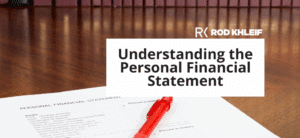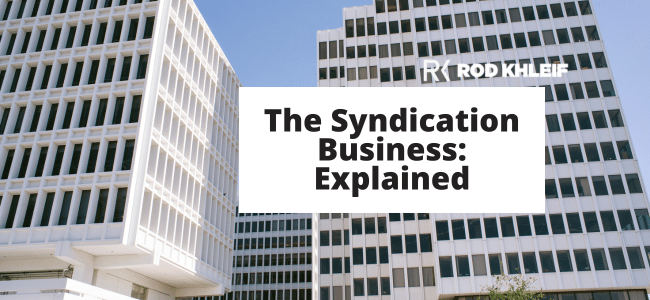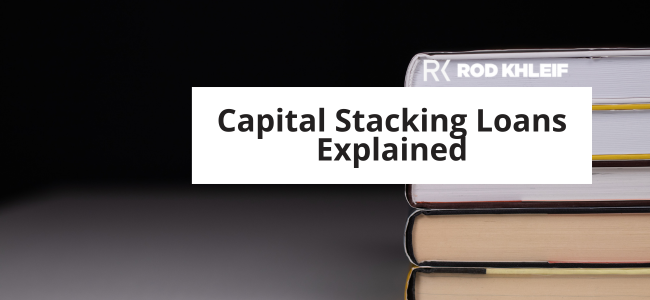Recourse vs. Non-Recourse Multifamily Financing: What’s the Difference?
Nobody goes into a multifamily investment expecting to
default on their mortgage.
Still, it happens. And if one of your properties has slipped
into foreclosure, the odds are you’ll likely lose that property.
So, what happens next?
Subscribe to the Podcast on iTunes! 
Do you want to learn more about Multifamily Real Estate Investing? Work with Rod in the Lifetime CashFlow Academy’s Multifamily Course & Coaching Program
The Basic Question: Recourse vs. Non-Recourse
The answer to that question depends on whether or not your loan includes or excludes recourse for the lender. What’s the difference?
Recourse
A recourse loan is one in which the investor personally secures the loan. In the case of default, the owner becomes personally liable for any difference between the loan balance and the property’s value upon sale. The lender can go after the owner’s assets to recoup their losses.
Obviously, this puts the lion’s share of risk in the investor’s corner. Why would an investor agree to it? In general, recourse loans are less strict in terms of loan requirements. Underwriting is a little more relaxed, and time-to-close is sometimes shorter. Since the lender takes on less risk, recourse loans usually offer more generous terms than their non-recourse counterparts.
Why would an investor agree to it?

The major downside, as we saw above, is personal liability. Even if you were to put your properties in an LLC—an absolute must—most lenders will require that you sign a personal guarantee on the loan. This effectively establishes whatever loan you acquire as a recourse loan.
Common Types of Recourse Loans:
- Commercial Bank Loans (Conventional)
- Hard Money Lending
- Bridge Financing
- (Some) Portfolio Loans
For more on multi family financing options, check out my free coaching videos on Facebook
Non-Recourse
In contrast, a non-recourse loan is a financial product secured entirely by the property itself. In the case of default, the lender will have no recourse to the owner or investor‘s personal assets. In other words, the lender eats the losses in the event of a default.
The distinct advantage of a non-recourse loan is its limitation on personal liability. That protection, however, needs to be taken with a grain of salt. Virtually every non-recourse loan will include some form of a bad-boy carveout: stipulations that give the lender recourse in the event of fraud, criminal activity, and/or negligence on the investor’s part.
Since non-recourse loans represent added risk to the lender, they come with additional hoops for investors to jump through.
Loan requirements are often more exacting, requiring a proven investment track record, ample net worth, and sufficient liquidity to service the debt in the absence of positive cash flow. Underwriting is more strict than recourse lending. Property requirements are more narrow. Terms are often less favorable as well with higher interest rates and lower LTV ratios.
Finally, non-recourse financing typically requires a longer term with stiff prepayment penalties (defeasance)—making it less than ideal for any form of a short-hold strategy.
If you’re not planning to hold on to the property for a long time, non-recourse probably isn’t for you.
Common Types of Non-Recourse Loan Opportunities:

- Fannie Mae
- Freddie Mac
- Federal Housing Authority (FHA)
- CMBS
- Life Insurance Companies
- Mezzanine Financing
- (Some) Portfolio Loans
For more on multi family financing options, check out my free coaching videos on Facebook.
Which is Better?
As with many things in this business, the answer to this question is ‘it depends.’
In general, non-recourse debt is a safer bet than recourse.
In addition to careful business structuring, non-recourse loans will help an investor protect his or her assets in the event of an unavoidable (or strategic) default. These loans are perfect for stabilized, long-term properties with an established track record in a reliable market.
Even so, recourse loans still make up the majority of commercial financing products out there. The liability aspect isn’t ideal, but the variety of products available with more favorable terms ends up translating into a real financial incentive to go with recourse financing. For renovations and repositions, the shorter terms on these loans better facilitate short-hold investment strategies.
Who’s Going to Take the Risk?
Another way to look at this question is to acknowledge that, one way or another, someone is going to take a risk in financing this property: you or the lender. Reduce that risk, and you’ll lower the cost of shouldering its burden. Reduce it far enough, and the savings and flexibility involved with recourse lending may outweigh the protections of non-recourse.
How do you do that?
Multifamily investment is always going to involve a measure of risk. With careful market analysis, patient due diligence, and a willingness to learn from others’ mistakes, you can cut those risks down significantly. While my preference is to use non-recourse financing to mitigate risk further, that doesn’t mean I’m willing to rule out recourse financing in some scenarios.
So, be smart. Triple check your numbers. Stress test your deal. Structure your business properly. Carry the right insurance. Concentrate on cash flow from Day 1, and you’ll give yourself all the protection you need to feel comfortable enough in going with recourse financing.
Triple check your numbers. Structure your business. Carry the right insurance.
If you want to know more about recourse vs. non-recourse financing—or if you need help evaluating the terms of any specific loan product, come join us on Facebook. We’ve got over 20,000 multifamily investors who’d love to collaborate in order to help you reach your goals.

















